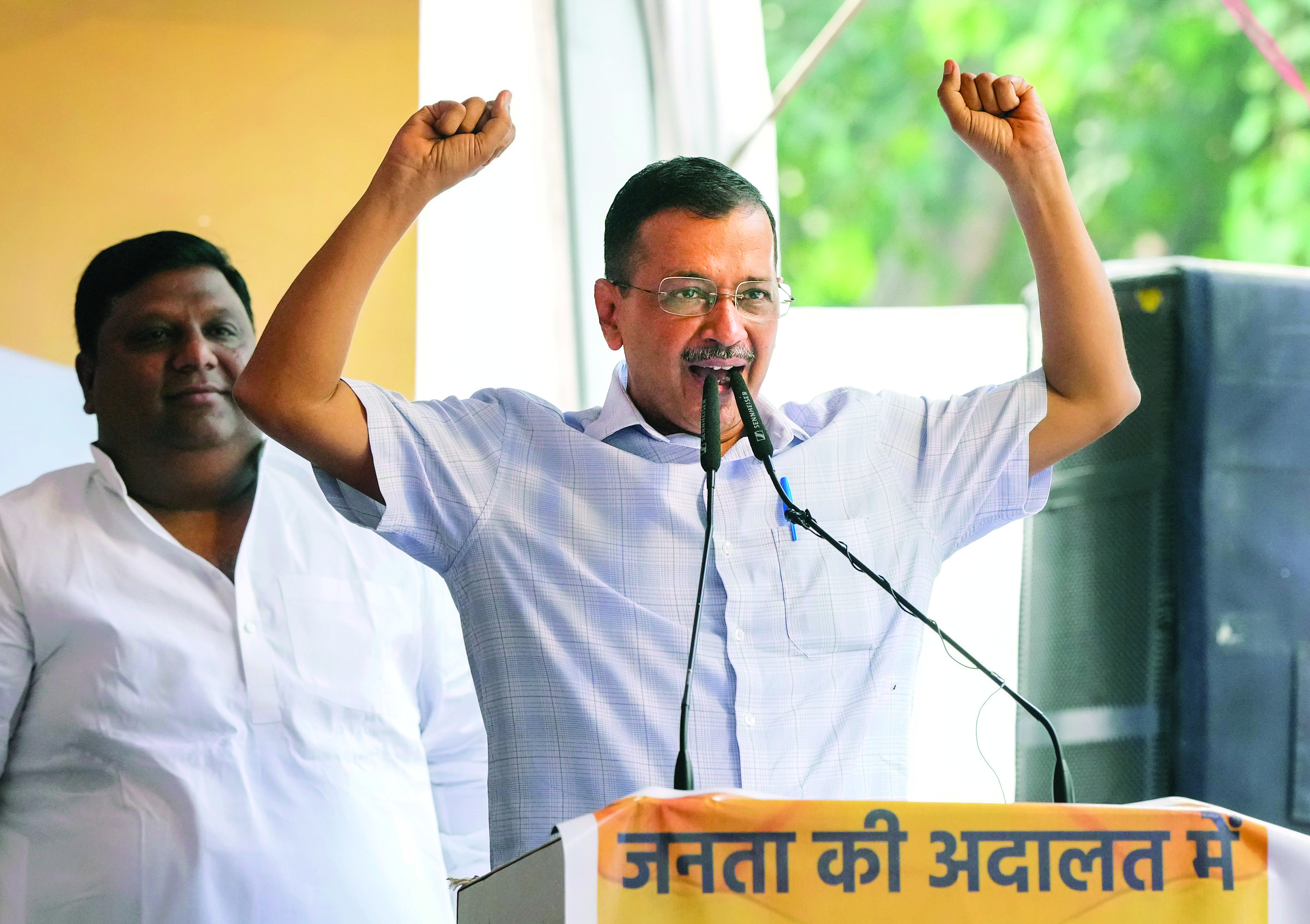Kejriwal attacks Modi, poses five questions to RSS chief Bhagwat

New Delhi: In a striking display of political audacity, Aam Aadmi Party (AAP) chief Arvind Kejriwal launched a pointed critique of the Bharatiya Janata Party (BJP) and its parent organisation, the Rashtriya Swayamsevak Sangh (RSS), during his address at the ‘Janta Ki Adalat’ held at Jantar Mantar on Sunday. The event was marked by a large turnout of supporters, underscoring Kejriwal’s continued influence in Delhi politics as he posed five direct questions to RSS chief Mohan Bhagwat regarding the current political climate and practices.
Kejriwal’s questions centered on the alleged misuse of government agencies like the Enforcement Directorate (ED) and Central Bureau of Investigation (CBI) to intimidate political opponents and topple governments. “Do you support these actions?” Kejriwal inquired, emphasising the potential harm such tactics could inflict on Indian democracy. He lamented, “The way PM Modi is breaking the leaders of other parties and their parties across the country by luring, threatening, and intimidating them with ED and CBI, is this right for the country? Doesn’t Mohan Bhagwat think this is harmful to democracy?”
Kejriwal also took aim at the moral contradictions within the BJP, pointing out that leaders whom Modi had previously labelled as corrupt were now welcomed into the party. “The leaders whom PM Modi and Amit Shah themselves called the most corrupt just a few days ago were included in the BJP shortly after. Does Mohan Bhagwat agree with this type of politics?” he asked, further questioning whether Bhagwat had ever attempted to rein in these practices.
The rift between the RSS and the BJP was another focal point of Kejriwal’s address. Referring to a statement made by BJP National President JP Nadda, who asserted that the party no longer needed the RSS, Kejriwal remarked, “Has the ‘son’ grown up so much that he has started challenging his ‘mother’? The ‘son’ whom you nurtured and made Prime Minister, today, that son is turning around and showing his defiance towards the motherly organisation, the RSS.” He urged Bhagwat to reflect on the implications of such statements for the
RSS workers.
Kejriwal’s final query addressed the controversial 75-year retirement rule implemented by the RSS. He highlighted that this rule had resulted in the retirement of prominent leaders like LK Advani and Murli Manohar Joshi. “I want to ask Mohan Bhagwat whether he agrees that the rule which applied to Lal Krishna Advani should not apply to Narendra Modi?” Kejriwal stated, putting Bhagwat in a position to justify perceived double standards within the party.
The address also served as a platform for Kejriwal to connect with the public in light of the upcoming Delhi Assembly elections, which he described as his “Agni Pariksha” or test by fire. “If you think Kejriwal is honest, then vote for me, if you think Kejriwal is dishonest, then don’t vote for me at all,” he declared, positioning his personal integrity as a pivotal issue in the election.
Reflecting on the challenges faced by AAP, he expressed the emotional toll of being labelled corrupt by political adversaries, stating, “These people are thick-skinned, but when they call me corrupt, it affects me deeply.” Kejriwal emphasised his commitment to transparency, asserting that he has not accumulated wealth during his tenure as Chief Minister. “I have only earned your love and blessings,” he noted, announcing his intention to leave the Chief Minister’s residence after Navratri and live among the people.
During his address, he recounted the achievements of his government over the past decade, emphasising improvements in public services like free electricity, education, and healthcare. “If I were dishonest, would I have been able to make electricity free in Delhi?” he challenged, contrasting the provisions in Delhi with those in BJP-ruled states.
Kejriwal’s address resonated with supporters who gathered in large numbers, many holding signs proclaiming “My Kejriwal is honest.” The enthusiasm of the crowd was palpable, as chants of “Kejriwal-Kejriwal” echoed through Jantar Mantar.
As the event concluded, the audience’s sentiment was clear. One attendee remarked, “Kejriwal has always stood for the common man. He’s the only leader who has really connected with us.” Another added, “I believe him, he’s honest. The real corruption lies with those trying to bring him down.”
Furthermore, criticism of the event came from opposition figures, including Congress leader Sandeep Dixit, who dismissed the gathering as a “sponsored event” and predicted that Kejriwal would soon be a “permanent resident of Tihar Jail.”
While Kejriwal continues to position himself as a champion of honesty in politics, the implications of his questions to the RSS chief will likely reverberate throughout the political sphere in the lead-up to the Delhi Assembly elections. The challenge he has issued not only to the RSS but to the broader political landscape emphasises his resolve to redefine political norms in India, seeking accountability from those in power while appealing directly to the electorate for validation of his governance.



